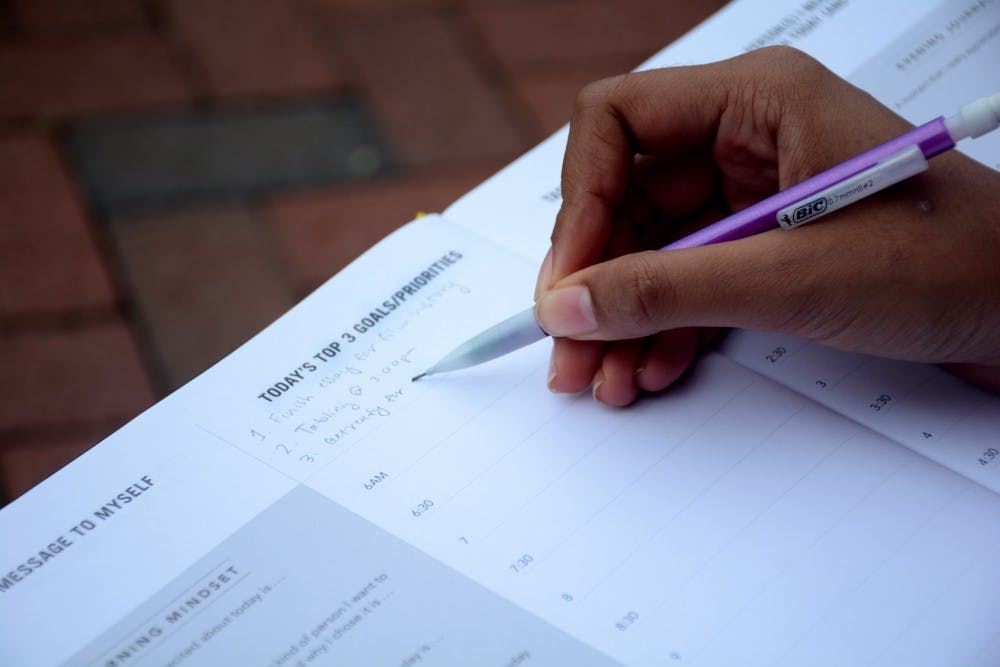As a new semester peers around the corner, the few days leading up to the start provides University students critical time to reflect on past semesters and brainstorm any changes — or “New Year’s resolutions” — they would like to make in their college lifestyles.
However, the inevitable disappointment linked to New Year’s resolutions is a sensation all-too familiar to most — feelings of hope, optimism and mantras of “this year will be different” while ultimately tossing goals in the trash a few days later. To prevent this and encourage success instead, University students have provided their own aspirations and advice to start and end a new semester on a high note.
Second-year College student Justin Magill spoke of past time-management mistakes and a desire to tackle this fall with a fresh mindset. Magill strategically planned out his classes for the upcoming semester based on his first-year experiences with morning classes. He described his aim to maximize his productivity throughout the day.
“[This semester] I scheduled my classes later so that I actually sleep enough,” Magill said. “I’ll then try to go to the library more often in-between classes, so I can get my work done and have more free time in the afternoon.”
Whether it’s a library or a coffee shop, University students may find that certain places become easily associated with an activity or habit. Second-year College student Justin Logan is mindful of the connotations he will be creating in his new living space.
“I’m in a house this year with some of my friends, so ... I’ll just have to establish early on that there are times that I have to shut the door and just get work done while I’m in the house,” Logan said. “If I can establish that early on, then I think it’ll be easier to maintain throughout the year.”
Although incoming first-year Engineering student Nicholas Yantiss does not have a prior semester to compare, he conveyed his intentions to take advantage of the ample and diverse opportunities the University has to offer.
“Now that my schedule is more flexible and curated, I want to make the most of my day … so that I’ll have more time to immerse myself in student life,” Yantiss said. “Finding a club where there are other people with similar interests [to me] will be something I want to take advantage of.”
While it can be easy to create goals or resolutions, it is often difficult to implement them. University students have prepared various strategies in order to set themselves up for success. Some students rely on agendas, while others are meticulous about their course schedules.
In an email to The Cavalier Daily, fourth-year College student Isabelle Rennert commented on the use of a planner in order to be reminded of her schedule and short-term goals.
“Honestly, just writing what I have to get done that day in terms of work in classes helps, so that I can have a visual reminder.” Rennert said.
While all the aforementioned resolutions address practical goals and intentions, second-year College student Rachel Roenicke imparted advice specifically geared towards mental and emotional care.
“Don’t put too much pressure on yourself,” Roenicke said. “Don’t compare yourself to others too much because you’re your own person, and you have your own strengths and weaknesses.”
Third-year College student Alex Markiewicz also emphasized the importance of focusing on personal goals rather than making comparisons among other students. She explained that concentrating on what other students are doing can make personal motivations or achievements feel less dignified. She noted that students should feel rewarded after accomplishing their goals, no matter how small.
“You should take the time to feel rewarded,” Markiewicz said. “Some people look at something that’s impressive and move on to the next thing. Let’s say you do well on an exam. You should celebrate a little bit. You shouldn’t move on to the next thing so quickly.”
Markiewicz finds that making goals goes hand-in-hand with balance. Although academic goals are significant, she detailed that goals should also be diversified to make space for other areas of interest.
“There isn’t time for everything … Focus on what’s important and [that] you’re doing those things to your best ability,” said Markiewicz, “You should be doing something small every day that makes you happy.”







